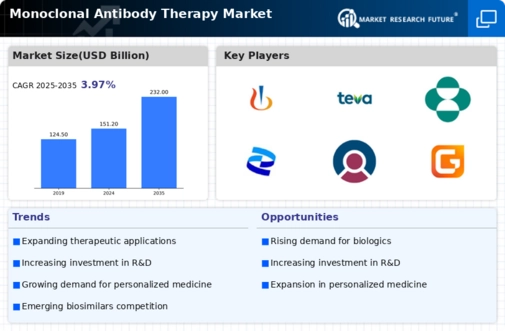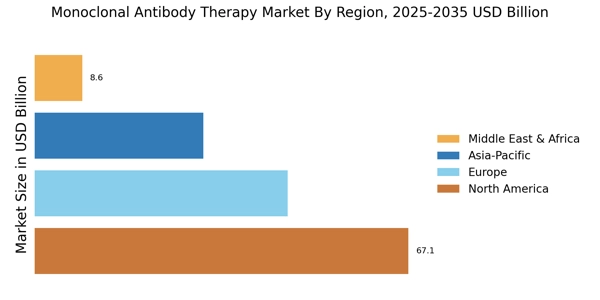Advancements in Biotechnology
Technological innovations in biotechnology are significantly influencing the Monoclonal Antibody Therapy Market. The development of novel platforms for antibody production, such as recombinant DNA technology and hybridoma techniques, has enhanced the efficiency and scalability of monoclonal antibody manufacturing. These advancements not only reduce production costs but also improve the quality and consistency of therapeutic antibodies. Furthermore, the integration of artificial intelligence and machine learning in drug discovery processes is streamlining the identification of potential monoclonal antibody candidates. As a result, the Monoclonal Antibody Therapy Market is poised for growth, with an increasing number of therapies entering clinical trials and subsequently gaining regulatory approval.
Rising Demand for Targeted Therapies
The shift towards personalized medicine and targeted therapies is reshaping the Monoclonal Antibody Therapy Market. Patients and healthcare providers are increasingly favoring treatments that offer specificity and reduced side effects compared to traditional therapies. Monoclonal antibodies, with their ability to target specific antigens, are well-positioned to meet this demand. Market analysis indicates that the targeted therapy segment is expected to grow at a compound annual growth rate of over 10% in the coming years. This trend is likely to drive the Monoclonal Antibody Therapy Market as more healthcare professionals adopt these therapies in clinical practice, aiming to enhance treatment efficacy and improve patient quality of life.
Increasing Prevalence of Chronic Diseases
The rising incidence of chronic diseases such as cancer, autoimmune disorders, and infectious diseases is a primary driver for the Monoclonal Antibody Therapy Market. As healthcare systems grapple with the growing burden of these conditions, the demand for effective treatment options intensifies. According to recent estimates, chronic diseases account for approximately 70% of all deaths worldwide, underscoring the urgent need for innovative therapies. Monoclonal antibodies, known for their specificity and efficacy, are increasingly being utilized in treatment regimens, thereby propelling market growth. The Monoclonal Antibody Therapy Market is expected to witness substantial expansion as healthcare providers seek to incorporate these therapies into standard care protocols, aiming to improve patient outcomes and reduce healthcare costs.
Growing Investment in Research and Development
The Monoclonal Antibody Therapy Market is experiencing a surge in investment directed towards research and development. Pharmaceutical companies and biotechnology firms are allocating substantial resources to discover and develop new monoclonal antibodies, driven by the potential for high returns on investment. In recent years, R&D spending in the biopharmaceutical sector has reached unprecedented levels, with estimates suggesting that it could exceed $200 billion annually. This influx of capital is facilitating the exploration of novel therapeutic targets and the development of next-generation monoclonal antibodies. Consequently, the Monoclonal Antibody Therapy Market is likely to benefit from a robust pipeline of innovative therapies, enhancing treatment options for patients.
Regulatory Support and Streamlined Approval Processes
Regulatory agencies are increasingly providing support for the development and approval of monoclonal antibody therapies, which is a crucial driver for the Monoclonal Antibody Therapy Market. Initiatives aimed at expediting the review process for innovative therapies, such as the FDA's Breakthrough Therapy designation, are encouraging companies to invest in monoclonal antibody development. These regulatory frameworks not only facilitate faster access to market but also enhance the likelihood of successful commercialization. As a result, the Monoclonal Antibody Therapy Market is witnessing a growing number of approved therapies, which in turn fosters competition and drives further innovation within the sector.

















